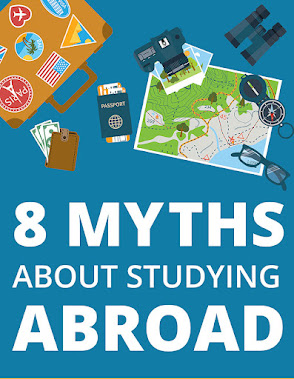The Top 8 Myths About Studying Abroad
Studying abroad can be a life-changing experience. Many students are discouraged from even considering studying abroad due to misinformation. Many of them also believe that studying abroad is prohibitively expensive for them and will not benefit their careers. The fact? The majority of them are myths.
Here are some of the most common myths about studying abroad. Continue reading to get your questions answered!
Myth 1: It is extremely expensive
This is a common misconception. There is a wide range of reasonably priced options as well, although some countries and courses do have very expensive programs. The cost of your education varies depending on your destination, university location, program type, and course duration.
Many Indian students prioritise their studies in the United States or Canada. Other nations, such as Germany, Australia, Italy, Spain, Denmark, and New Zealand, have, however, also recently gained popularity as study abroad destinations. Because most German colleges do not charge or charge very low tuition fees, Germany is a popular higher education destination for Indians.
Myth 2: There is only partying
Studying abroad isn’t just a fancy vacation. It is all about studying and developing valuable skills that will help you get a job. It’s important to let your parents know that you want to concentrate on your education and increase your career options.
Myth 3: It is dangerous.
There will always be parts of the world that are at war or in civil unrest, and it is best to avoid them. You can find the safest student cities by doing some research. Checking travel websites is also a good idea because they provide advice on where to travel safely. Thousands of Indian students travel to various countries each year to pursue their dream of higher education abroad. If they can do it, so can you.
Myth #4: You must be fluent in a foreign language.
English is widely spoken as the first language in many parts of the world. The best universities offer a variety of courses in English in most non-English speaking nations. It is not necessary to learn a foreign language in order to study abroad.
You can always enroll in a language course prior to the start of your chosen course if you want to pursue a course in a foreign language.
5. Study abroad is irrelevant to employers
Not true at all! Global corporations place a high value on international experience. Nowadays, a lot of businesses are global in scope, and they always favor hiring individuals who can interact and collaborate across cultural boundaries.
Learning the fundamentals of a foreign language while studying abroad is an accomplishment. Knowing a foreign language, in addition to having a foreign degree, can do marvels for your career opportunities.
Myth 6: It’s challenging to make friends abroad.
You can make friends wherever you go if you are a friendly and social person. There are a large number of students who study overseas, so it’s likely that you’ll run into others who are new to the location.
It’s a fantastic opportunity to meet people from all across the world. Many students have become lifelong friends as a result of their shared experience while studying abroad.
Myth 7: There aren’t enough scholarships available.
Many merit-based full and partial scholarships are offered by numerous universities around the world. On the basis of the financial needs of the students, numerous foreign governments, universities, and organizations also provide scholarships.
Details about the university- and college-based scholarships are available on their website. Additionally, a lot of private businesses, including Auxilo, provide you with student loan options.
Myth #8: The experience is identical to traveling abroad.
While a world tour is an excellent way to see the world, you will not have the opportunity to integrate with the locals, learn their culture, or acquire a new language during that time.
While traveling, you will be a tourist, whereas while studying abroad, you will live as a local in a foreign country. Your experience will be enhanced by the chance to socialize with individuals from different cultures, meet new people, and learn about new customs. To experience life to its fullest, it is always beneficial to study abroad.




Comments
Post a Comment